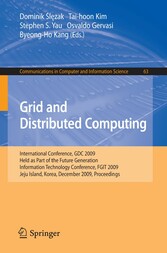Suchen und Finden
Mehr zum Inhalt

Grid and Distributed Computing - International Conference, GDC 2009, Held as Part of the Future Generation Information Technology Conferences, FGIT 2009, Jeju Island, Korea, December 10-12, 2009, Proceedings (Communications in Computer and Informatio
"A Dynamic Mobile Grid System for 4G Networks (p. 140-141)
Abstract. Future networks specially International Mobile Telecommunications- advanced, better known as 4G, will come up with a panoply of services so as to provide a comprehensive and secure IP-based solution where facilities such as voice, data and stremed multimedia will be provided to users anywhere at anytime.
This solution will also provide much higher data rates compared to previous generations. More importantly, the 4G architecture will strongly promote ubiquitous computing, which involves many computational devices and systems simultaneously. Such devices and systems can even be unaware that they are contributing to computational process. Grid systems have been known in traditional networks as an e?cient solution to provide distributed services.
However, their applicability to 4G networks is not straightforward because of the intrinsic features of serveral network categories. In this paper, we propose a new Grid architecture suitable with the characteristics of 4G networks. A particular emphasis will be put on the provision of ubiquitous computational services in and across ad hoc environments. We de?ne a new relational model enabling Grid service composing.
1 Introduction
Mobile networks are witnessing a prominent development. They are changing from being simple access means to value added service providers. In fact, considering the growing mobile population and the induced raw and unexploited resources, important applications and services could be de?ned based on the infrastructure provided by mobile networks. The advent of 4G networks will probably promote the development of more sophisticated services.
The architecture of these networks, mainly their cooperative nature, will allow the implementation of ubiquitous computational frameworks. In fact, 4G networks build bridges between traditionally heterogeneous networks (e.g., WLAN, UMTS, WSN) in a manner that the shortcuts of a network are overcame by the strengthes of other networks.
For instance, the short range characterizing ad hoc networks can be extended using mobile backbones (possibly constituted by cellular segments). This allows taking bene?t of the high transmission rates available through ad hoc networks over long ranges. Grid [1] is a distributed system composed of various, heterogeneous, autonomous and distributed resources such as processes, computing applications,"
Alle Preise verstehen sich inklusive der gesetzlichen MwSt.








